
Daniel Patrick Macnee was a British-American actor, best known for his breakthrough role as secret agent John Steed in the television series The Avengers (1961–1969). Starting out as the assistant to David Keel, he became the lead when Hendry left after the first series, and was subsequently partnered with a succession of female assistants. He later reprised the role in The New Avengers (1976–1977).

Dame Joanna Lamond Lumley is a British actress, presenter, former model, author, television producer, and activist. She has won two BAFTA TV Awards for her role as Patsy Stone in the BBC sitcom Absolutely Fabulous (1992–2012), and was nominated for the 2011 Tony Award for Best Featured Actress in a Play for the Broadway revival of La Bête. In 2013, she received the Special Recognition Award at the National Television Awards, and in 2017 she was honoured with the BAFTA Fellowship award.
Amicus Productions was a British film production company, based at Shepperton Studios, England, active between 1962 and 1977. It was founded by American producers and screenwriters Milton Subotsky and Max Rosenberg.
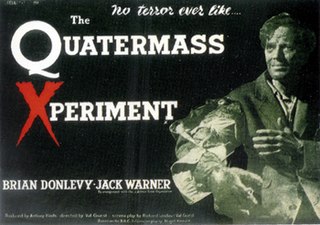
The Quatermass Xperiment is a 1955 British science fiction horror film from Hammer Film Productions, based on the 1953 BBC Television serial The Quatermass Experiment written by Nigel Kneale. The film was produced by Anthony Hinds, directed by Val Guest, and stars Brian Donlevy as the titular Professor Bernard Quatermass and Richard Wordsworth as the tormented Carroon. Jack Warner, David King-Wood, and Margia Dean appear in co-starring roles.
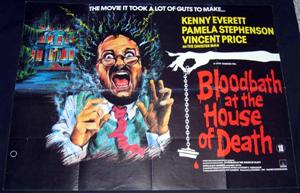
Bloodbath at the House of Death is a 1984 British comedy horror film directed by Ray Cameron and starring the comedian Kenny Everett, Pamela Stephenson and Vincent Price. It is an over-the-top spoof loosely inspired by The Amityville Horror and other horror films from the same period.
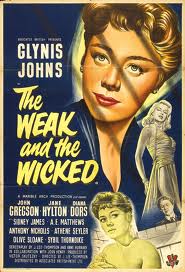
The Weak and the Wicked is a 1954 British drama film directed by J. Lee Thompson based on the autobiographical novel Who Lie in Gaol by his wife, Joan Henry, starring Glynis Johns and Diana Dors.

The Yellow Balloon is a 1953 British drama film directed by J. Lee Thompson and starring Andrew Ray, William Sylvester, Kathleen Ryan, Kenneth More and Hy Hazell. It was Thompson's second feature as director. It was distributed by Associated British and produced by the company's Marble Arch Productions. It was made at Elstree Studios with sets designed by the art director Robert Jones. Location shooting took place around Bayswater and Chelsea including Queensway tube station.

Sandra Dorne was a British actress.
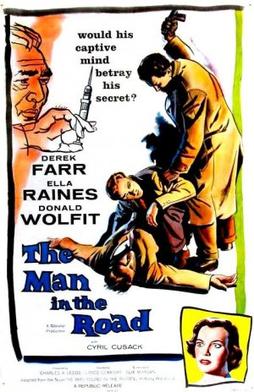
The Man in the Road is a 1956 British second feature thriller film directed by Lance Comfort and starring Derek Farr, Ella Raines, Donald Wolfit and Cyril Cusack. It was based on the 1952 novel He Was Found in the Road by Anthony Armstrong.

Patricia Dainton was a British actress who appeared in a number of films and television roles between 1947 and 1961.

Home to Danger is a 1951 British second feature film noir crime film directed by Terence Fisher starring Guy Rolfe, Rona Anderson and Stanley Baker.

Stolen Assignment is a 1955 British comedy 'B' film directed by Terence Fisher and starring John Bentley and Hy Hazell. It was produced by Francis Searle for Act Films Ltd and was a sequel to Fisher's Final Appointment (1954), featuring sleuthing journalists Mike Billings and Jenny Drew.

The Gelignite Gang is a black and white 1956 British second feature crime film directed by Terence Fisher and Francis Searle, starring Wayne Morris and Sandra Dorne. The film was released in the U.S. as The Dynamiters.
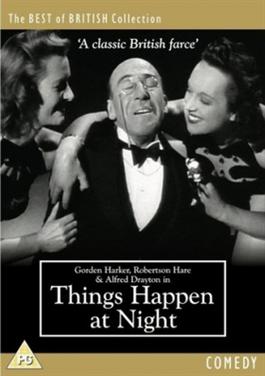
Things Happen at Night is a 1947 British supernatural ghost comedy film directed by Francis Searle and starring Gordon Harker, Alfred Drayton, Robertson Hare and Garry Marsh. The film is based upon a stage play, The Poltergeist, by Frank Harvey. It was shot at Twickenham Studios. Despite the film's comparatively large budget it ended up being released as a second feature.

Return of a Stranger is a 1961 British second feature thriller film directed by Max Varnel and starring John Ireland and Susan Stephen.

The Woman in Black is a 2012 gothic supernatural horror film directed by James Watkins from a screenplay by Jane Goldman. It is the second adaptation of Susan Hill's 1983 novel of the same name, which was previously filmed in 1989. The film stars Daniel Radcliffe, Ciarán Hinds, Janet McTeer, Sophie Stuckey, and Liz White. The plot, set in early 20th-century England, follows a young recently widowed lawyer who travels to a remote village where he discovers that the vengeful ghost of a scorned woman is terrorising the locals.
Urban Ghost Story is a 1998 British horror film directed by Geneviève Jolliffe, written by Geneviève Jolliffe and Chris Jones, and starring Jason Connery, Nicola Stapleton, Billy Boyd, Stephanie Buttle, and Heather Ann Foster. It is set in a high-rise housing estate in Glasgow.

Operation Murder is a 1957 British 'B' crime film directed by Ernest Morris and starring Tom Conway, Patrick Holt and Sandra Dorne. It was written by Brian Clemens and produced by the Danzinger brothers.

Blackout is a 1950 British crime drama film directed by Robert S. Baker and starring Maxwell Reed and Dinah Sheridan. It was made as a supporting feature.

The Mark of Cain is a 1947 British drama film directed by Brian Desmond Hurst and starring Eric Portman, Sally Gray, Patrick Holt and Dermot Walsh. The film is based on the 1943 novel Airing in a Closed Carriage by Marjorie Bowen, which in turn was based on the true life murder trial of Florence Maybrick. It was made at Denham Studios with sets designed by the art director Alex Vetchinsky.


















